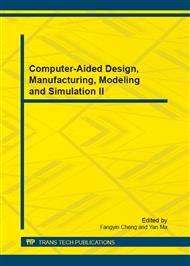p.418
p.423
p.428
p.433
p.441
p.446
p.451
p.456
p.461
Discrete Interval-Valued Stress-Strength Interference Model Based on the Extended Universal Generating Function
Abstract:
A new approach was proposed to estimate the reliability of a machine component when the probability density functions of stress and strength can not be exactly determined or only finite experiment data of stress and strength are available. The conventional universal generating function was introduced and then it was extended to represent the discrete interval-valued random variable. The experimental data of stress and strength were formulated as two discrete interval-valued random variables. Based on the extended universal generating function, a discrete interval-valued stress-strength interference model was proposed. An approach was proposed to solve the proposed stress-strength interference model and it can be used to calculate the upper and lower bounds of the component reliability. An example was given to demonstrate the proposed approach. It is showed that the proposed approach is suitable to the reliability estimation of a machine component when only finite experimental data of stress and strength can be obtained.
Info:
Periodical:
Pages:
441-445
Citation:
Online since:
December 2012
Authors:
Price:
Сopyright:
© 2013 Trans Tech Publications Ltd. All Rights Reserved
Share:
Citation:


